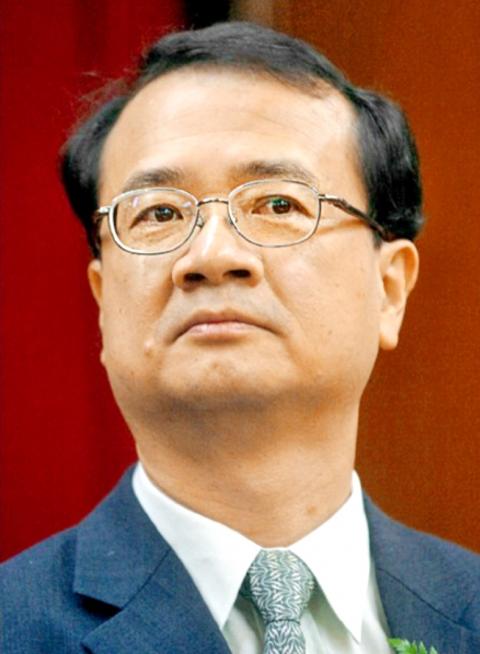Legal experts yesterday said that the Constitution bars former grand justice Hsu Tzong-li (許宗力) from heading the Judicial Yuan, following reports that President Tsai Ing-wen (蔡英文) was considering nominating him for the position.
National Taiwan University professor of law Chen Chih-lung (陳志龍) said that Hsu served as a grand justice from 2003 to 2011 — a mandated eight-year term — and an amendment to the Constitution prohibits an additional term.
In the Additional Articles of the Constitution, Article 5 says: “Each grand justice of the Judicial Yuan shall serve a term of eight years, independent of the order of appointment to office, and shall not serve consecutive terms. The grand justices serving as president and vice president of the Judicial Yuan shall not enjoy the guarantee of an eight-year term.”

Photo: Lo Pei-der, Taipei Times
“That article was part of an amendment to prevent grand justices from bowing to the wishes of political figures when making constitutional interpretations,” Chen said. “Hsu’s appointment to serve as a grand justice again is unconstitutional and it would be an international joke.”
The amendment says that the Judicial Yuan has 15 grand justices, while the president and vice president of the body are to be selected from among them, being “nominated and, with the consent of the Legislative Yuan, appointed by the president of the Republic” of China.
Presidential Office officials said they have consulted legal experts regarding the issue.
The appointment would be legal and there would be no breach of the Constitution in nominating Hsu, the officials said.
Hsu would be “reappointed,” not “serving consecutive terms,” which are two different concepts, they said.
Hsu was not continuing as a grand justice to serve for another term, because he retired from the post, the officials said. Academics and experts on constitutional law were consulted and they concurred that the move would not be a breach of Article 5, therefore the government will go ahead with Hsu’s nomination.
Tsai has faced a number of obstacles filling the Judicial Yuan’s presidency and No. 2 post, with her first picks, Public Functionary Disciplinary Sanction Commission Chief Commissioner Hsieh Wen-ting (謝文定) and Judicial Yuan Secretary-General Lin Chin-fang (林錦芳) withdrawing over past controversies.

Intelligence agents have recorded 510,000 instances of “controversial information” being spread online by the Chinese Communist Party (CCP) so far this year, the National Security Bureau (NSB) said in a report yesterday, as it warned of artificial intelligence (AI) being employed to generate destabilizing misinformation. The bureau submitted a written report to the Legislative Yuan in preparation for National Security Bureau Director-General Tsai Ming-yen’s (蔡明彥) appearance before the Foreign Affairs and National Defense Committee today. The CCP has been using cognitive warfare to divide Taiwanese society by commenting on controversial issues such as Taiwan Semiconductor Manufacturing Co’s (TSMC, 台積電) investments in the

INVESTIGATION: The case is the latest instance of a DPP figure being implicated in an espionage network accused of allegedly leaking information to Chinese intelligence Democratic Progressive Party (DPP) member Ho Jen-chieh (何仁傑) was detained and held incommunicado yesterday on suspicion of spying for China during his tenure as assistant to then-minister of foreign affairs Joseph Wu (吳釗燮). The Taipei District Prosecutors’ Office said Ho was implicated during its investigation into alleged spying activities by former Presidential Office consultant Wu Shang-yu (吳尚雨). Prosecutors said there is reason to believe Ho breached the National Security Act (國家安全法) by leaking classified Ministry of Foreign Affairs information to Chinese intelligence. Following interrogation, prosecutors petitioned the Taipei District Court to detain Ho, citing concerns over potential collusion or tampering of evidence. The

‘COMPREHENSIVE PLAN’: Lin Chia-lung said that the government was ready to talk about a variety of issues, including investment in and purchases from the US The National Stabilization Fund (NSF) yesterday announced that it would step in to staunch stock market losses for the ninth time in the nation’s history. An NSF board meeting, originally scheduled for Monday next week, was moved to yesterday after stocks plummeted in the wake of US President Donald Trump’s announcement of 32 percent tariffs on Taiwan on Wednesday last week. Board members voted to support the stock market with the NT$500 billion (US$15.15 billion) fund, with injections of funds to begin as soon as today. The NSF in 2000 injected NT$120 billion to stabilize stocks, the most ever. The lowest amount it

NEGOTIATIONS: Taiwan has good relations with Washington and the outlook for the negotiations looks promising, Minister of Economic Affairs J.W. Kuo said Taiwan’s GDP growth this year is expected to decrease by 0.43 to 1.61 percentage points due to the effects of US tariffs, National Development Council (NDC) Minister Paul Liu (劉鏡清) said at a meeting of the legislature’s Economics Committee in Taipei yesterday, citing a preliminary estimate by a private research institution. Taiwan’s economy would be significantly affected by the 32 percent “reciprocal” tariffs slapped by the US, which took effect yesterday, Liu said, adding that GDP growth could fall below 3 percent and potentially even dip below 2 percent to 1.53 percent this year. The council has commissioned another institution